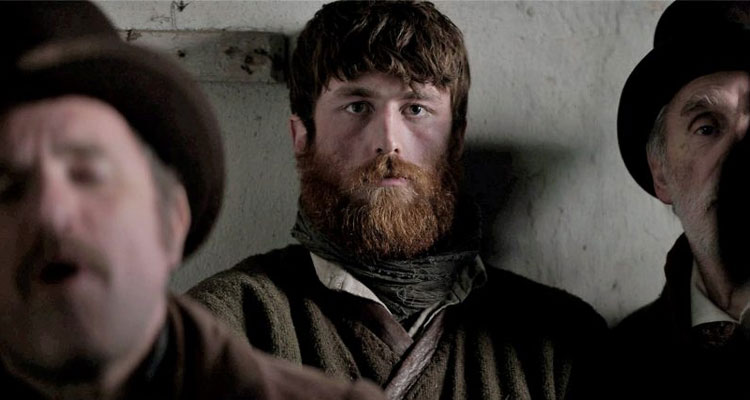The Plot:
The year is 1847 and Ireland is in the grip of extreme poverty. Starvation has killed close to one million people, many of them dying on the roadside. The lucky, if you can call them that, have managed to raise the funds necessary to make the treacherous journey to a new life in America. Martin Feeney (James Frecheville), a veteran of the British army, returns home to his native Connemara and is shocked to see what has become of his homeland. With many family members dead and more to suffer a terrible fate, Feeney sets about seeking vengeance on those who have caused the Irish to fall into such despair. Hot on his heels is Hannah (Hugo Weaving), a disgraced former soldier who has a history with Feeney.
The Verdict:
It is hard to believe that this is the first time that the Irish Famine has been portrayed onscreen. Director Lance Daly’s take on those dark days is stark, visceral and bleak and utterly compelling. Mixing Gaeilge with English and shot in muted colours the film gives us an insight into an Ireland never seen onscreen.
Daly has assembled a strong cast which lists some of Ireland’s finest at the forefront. Moe Dunford, Sarah Greene and Barry Keoghan head up the younger generation, with Stephen Rea giving a scene-stealing performance as a wily translator roped into aiding Hannah and his commanding officer. Freddie Fox plays Pope, the young officer, hoping to win a name for himself by capturing the rebel, Feeney. He plays him with suitable haughty distaste whilst Jim Broadbent rounds out the cast playing Lord Kilmichael, the landlord at the head of Feeney’s hit list.
It is a difficult subject and Daly presents us with a western-style movie, perhaps to ease us into the harshness of the time. Feeney’s actions are violent and little is held back for the imagination but perhaps more shocking is the sight of skeletons left unburied in the fields of Connemara. This is not a film to be enjoyed but it certainly is something to be experienced.
As Feeney and Hannah’s past comes into play we see an understanding between the two soldiers. It is through this where we see Daly’s bid not to over-politicise a subject that could easily have been presented entirely from one perspective. Keoghan’s character, too, serves to remind that for all the Kilmichaels and Popes, for some, serving in 1840s Ireland really was just a job. It is a testament to Keoghan’s ability as an actor that he can bring such emotion to a relatively small role.
Black 47 can be watched from two perspectives: the vengeance western, and the crucially important Irish film that it is. It is not perfect. There are some niggles on the technical side, it meanders a little but on the grand scheme of things these issues matter little. The power in this film is in its vision and its execution. Powerful performances, an emotive plot, and a visionary director have given us a film that commands an audience and stays with the watcher long after they have left the darkness of the cinema.
Rating: 4.5 / 5
Review by Cara O’Doherty


